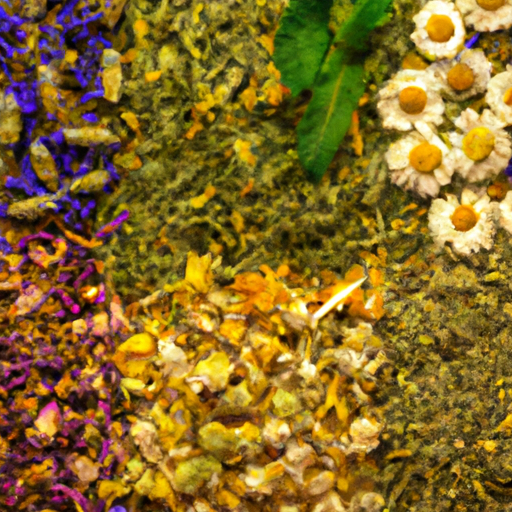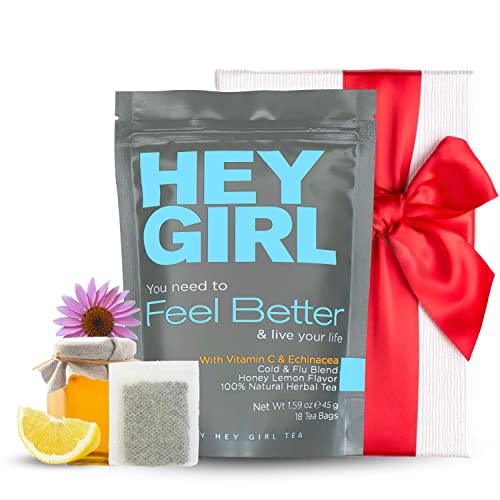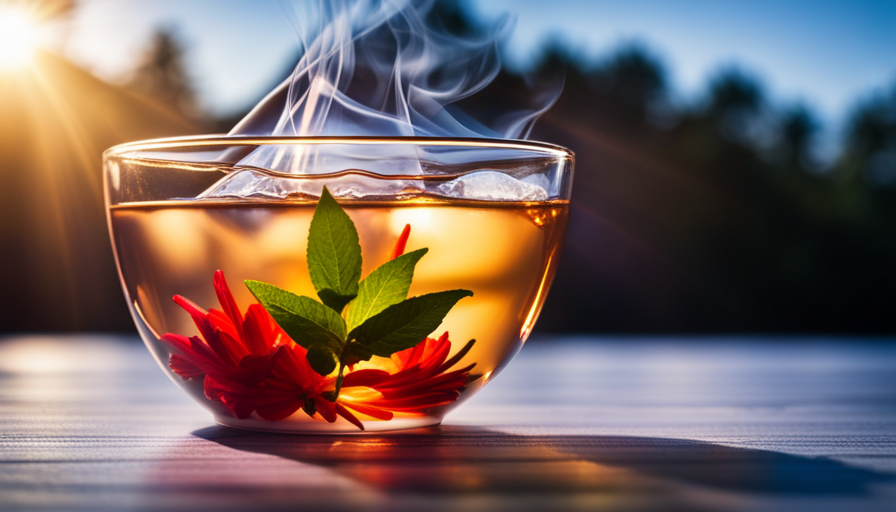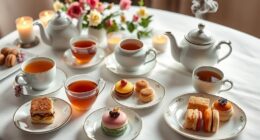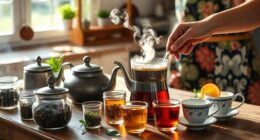Ever thought about what goes into making that calming cup of herbal tea? As someone who loves tea and knows a lot about herbs, I’ve explored the world of herbal teas to discover the secrets behind their calming and healing effects.
Picture this: you’re sitting in a cozy corner of your favorite café, a steaming cup of herbal tea in hand, the aroma wafting up and enveloping your senses. It’s like a warm hug from nature itself, isn’t it?
But what exactly comprises this magical elixir? Well, let me enlighten you. Herbal teas are a blend of various herbs, each with its unique taste and therapeutic benefits. From the calming chamomile to the refreshing peppermint, the fragrant lavender to the invigorating ginger, the zesty lemon balm to the immune-boosting echinacea, and the vibrant hibiscus, these herbs work in harmony to create a harmonious symphony of flavors and wellness.
So, let’s embark on this delightful journey together and uncover the wonders of the herbs that make up herbal tea.
Key Takeaways
- Herbal teas are a blend of various herbs with unique tastes and therapeutic benefits.
- Chamomile, peppermint, lavender, ginger, lemon balm, echinacea, and hibiscus are commonly used herbs in herbal teas.
- These herbs offer a wide range of benefits including soothing properties, calming effects, digestive aid, headache relief, improved sleep quality, anti-inflammatory and antioxidant properties, skin soothing properties, stress and anxiety reduction, immune-boosting benefits, and blood pressure lowering effects.
- Adjusting brewing time and temperature allows for customization of the flavor and potency of herbal teas.
Chamomile
Chamomile, with its soothing properties and delicate floral notes, is a beloved herb commonly found in herbal tea blends. This herb has been used for centuries due to its numerous health benefits. Chamomile tea is known for its calming effects, making it a popular choice for those seeking relaxation and improved sleep quality. It contains compounds like apigenin, which is believed to have sedative properties and can help reduce anxiety and promote better sleep. Additionally, chamomile tea is known to have anti-inflammatory and antioxidant properties, which can help support a healthy immune system.
Making chamomile tea at home is simple and requires just a few steps. Start by boiling water and adding fresh or dried chamomile flowers to a teapot or cup. Allow the flowers to steep for about 5 minutes, or longer for a stronger flavor. Strain the tea and enjoy it hot or chilled. If desired, you can add honey or lemon for extra flavor.
Transitioning to the next section, peppermint is another popular herb found in herbal tea blends.
Peppermint
Peppermint is a delightful addition to your cup, bringing a refreshing and invigorating flavor that may surprise even the most skeptical tea drinkers. This aromatic herb, scientifically known as Mentha piperita, has been used for centuries for its various health benefits. Peppermint tea is known to aid in digestion, relieve headaches, and reduce menstrual cramps. It is also believed to have antimicrobial properties, helping to fight off bacteria and viruses.
Let’s take a closer look at the benefits of peppermint tea. In a 2 column and 4 row table, we can clearly see the advantages this herbal tea offers:
| Peppermint Benefits | Peppermint Tea Recipes |
|---|---|
| Aids digestion | Peppermint iced tea |
| Relieves headaches | Peppermint mocha latte |
| Reduces menstrual cramps | Peppermint hot chocolate |
| Has antimicrobial effects | Peppermint herbal blend |
Peppermint tea can be enjoyed in many different ways. Some popular recipes include peppermint iced tea, peppermint mocha latte, peppermint hot chocolate, and a refreshing peppermint herbal blend.
Now, let’s move on to the next herb in our exploration of herbal tea, lavender.
Lavender
Lavender, a popular herb in herbal tea, has numerous benefits for both the mind and body. It’s known for its ability to calm the mind and reduce anxiety, making it an excellent choice for those seeking relaxation.
Additionally, lavender promotes restful sleep, helping individuals attain a more peaceful night’s rest.
Lastly, it has soothing properties that can alleviate various skin irritations.
Overall, lavender is a versatile herb that offers a multitude of health benefits.
Calms the Mind and Reduces Anxiety
Sipping on a warm cup of herbal tea can help ease the mind and soothe anxious thoughts. One of the key ingredients in herbal tea is lavender, which is known for its calming effects and stress relief properties. Here are three reasons why lavender can help calm the mind and reduce anxiety:
-
Aromatherapy: The scent of lavender has been shown to have a relaxing effect on the brain, reducing stress and promoting a sense of calm.
-
Sedative properties: Lavender contains compounds that have mild sedative effects, helping to promote relaxation and reduce anxiety levels.
-
Anti-anxiety effects: Research suggests that lavender can interact with certain neurotransmitters in the brain, helping to regulate mood and reduce symptoms of anxiety.
With its calming properties, lavender in herbal tea can also promote restful sleep. By soothing the mind and reducing anxiety, it creates an ideal environment for a peaceful night’s rest.
Promotes Restful Sleep
Inducing a state of tranquility, a warm cup of this soothing beverage can greatly enhance the quality of your sleep. Herbal tea, with its natural sleep aids, promotes restful sleep by calming the mind and reducing anxiety. Certain herbs commonly found in herbal teas have been used for centuries to aid in relaxation and promote a peaceful slumber. Chamomile, valerian root, lavender, and passionflower are some of the key ingredients that contribute to the sleep-inducing properties of herbal tea. These herbs have been scientifically proven to have sedative effects, helping to reduce insomnia and improve sleep quality. Sipping on a cup of herbal tea before bed can provide a gentle and natural way to wind down and prepare your body for a restful night’s sleep. As we explore the next topic about soothing skin irritations, it is important to note that herbal teas have a wide range of benefits beyond just promoting sleep.
Soothes Skin Irritations
Chamomile, valerian root, and passionflower aren’t just beneficial for promoting restful sleep, but they also have the remarkable ability to soothe and calm irritated skin. These herbs contain compounds that have anti-inflammatory properties, making them effective natural remedies for skin inflammation. Chamomile, in particular, contains chamazulene, a powerful anti-inflammatory agent that can help reduce redness and swelling. Valerian root and passionflower also have soothing effects on the skin, providing relief from itchiness and discomfort.
Incorporating these herbs into a topical herbal tea or applying them directly to the affected area can provide immediate relief for various skin irritations such as rashes, eczema, and insect bites.
Moving on to ginger, this versatile herb not only adds a spicy flavor to herbal teas, but it also offers numerous health benefits.
Ginger
Ginger is a key ingredient in herbal tea, adding a warm and spicy kick to every sip. It not only enhances the flavor but also provides numerous health benefits. Ginger is known for its anti-inflammatory properties, making it effective in soothing skin irritations. It can help reduce redness, itching, and inflammation caused by conditions like eczema or psoriasis. Additionally, ginger contains antioxidants that can help fight signs of aging and improve overall skin health.
Incorporating ginger into your herbal tea can be as simple as adding a few thin slices to hot water and letting it steep for a few minutes. However, if you want to get creative, there are various ginger tea recipes available. You can combine ginger with other herbs like turmeric or cinnamon to enhance its health benefits. Some recipes even include honey or lemon for added flavor.
Next, let’s explore the benefits of lemon balm, another herb commonly found in herbal tea blends. Lemon balm has a refreshing citrus scent and offers its own unique health benefits.
Lemon Balm
To add a refreshing twist to your beverage, why not try incorporating lemon balm, an herb with a delightful citrus scent and its own unique health benefits?
Lemon balm, also known as Melissa officinalis, is a member of the mint family and has been used for centuries due to its medicinal properties. It’s commonly used in herbal tea blends for its calming effects and pleasant flavor.
Lemon balm offers a range of benefits, making it a fantastic addition to your herbal tea. Firstly, it’s been shown to reduce stress and anxiety, promoting a sense of calm and relaxation. Additionally, lemon balm can help improve sleep quality, making it a great bedtime tea option. It also has antiviral properties and can be effective in relieving cold sores caused by the herpes simplex virus.
To enjoy the benefits of lemon balm, you can try various tea recipes. One simple recipe involves steeping a handful of fresh lemon balm leaves in hot water for about 10 minutes. You can also combine lemon balm with other herbs like chamomile or lavender for a soothing and aromatic blend.
Moving on to the next topic, let’s explore the wonders of echinacea and its immune-boosting properties.
Echinacea
After exploring the benefits of Lemon Balm in herbal tea, let’s delve into another fascinating herb: Echinacea. Echinacea, also known as the purple coneflower, is a herb native to North America. It’s been used for centuries due to its medicinal properties and is a popular ingredient in herbal teas.
Echinacea is renowned for its immune-boosting benefits. It contains compounds that stimulate the production of white blood cells, enhancing the body’s natural defense against infections and illnesses. Moreover, Echinacea is believed to have anti-inflammatory properties, aiding in the reduction of symptoms associated with colds and respiratory infections.
To enjoy the benefits of Echinacea, you can easily prepare Echinacea tea. Simply steep the dried Echinacea root or leaves in boiling water for about 10 minutes. You can also experiment with different recipes by combining Echinacea with other herbs like chamomile or ginger for added flavor and health benefits.
Now, let’s move on to our next herb: hibiscus. Hibiscus is a vibrant flower that not only adds a beautiful touch to herbal teas but also offers a plethora of health benefits.
Hibiscus
Blooming like a radiant sunset, hibiscus infuses herbal concoctions with its vibrant colors and a myriad of health benefits.
Hibiscus tea, derived from the dried petals of the hibiscus flower, is a popular herbal infusion known for its tangy flavor and numerous health benefits.
One of the standout benefits of hibiscus tea is its potential to lower blood pressure. Research has shown that regularly consuming hibiscus tea may help lower both systolic and diastolic blood pressure levels. This is attributed to the presence of natural compounds called anthocyanins, which have been found to have vasodilatory and anti-inflammatory effects.
In addition to its blood pressure-lowering properties, hibiscus tea is also rich in antioxidants. These powerful molecules help protect the body against damage caused by harmful free radicals, which are associated with various chronic diseases.
When it comes to brewing hibiscus tea, it’s important to note that the ideal brewing time and temperature can vary. Generally, a brewing time of 5-7 minutes and a water temperature of 200°F (93°C) are recommended. However, some individuals may prefer a stronger or milder infusion, so adjusting the brewing time and temperature to personal taste is always an option.
Hibiscus tea offers a delightful combination of vibrant colors and health benefits. From its potential to lower blood pressure to its antioxidant properties, incorporating hibiscus tea into your daily routine can contribute to a healthier lifestyle. So, why not indulge in a cup of this tangy and nourishing herbal infusion?
Frequently Asked Questions
Are there any potential side effects or allergies associated with drinking herbal tea made with these herbs?
Potential side effects and allergies associated with drinking herbal tea made with these herbs may include gastrointestinal discomfort, allergic reactions, and interference with certain medications. However, the effectiveness of herbal tea in relieving stress and promoting relaxation has been supported by scientific research.
How should I properly steep the herbal tea to get the best flavor and health benefits?
To properly steep herbal tea, use water that is just below boiling and steep for 5-7 minutes. For enhanced flavor, try adding a slice of lemon or a teaspoon of honey. Steeping times may vary depending on the specific herbs used.
Can herbal tea made with these herbs help with specific health conditions, such as anxiety or digestion?
Herbal tea can be a soothing remedy for sleep disorders, but its effectiveness varies. It’s important to note potential interactions between herbal tea and medication for specific health conditions. Consult a healthcare professional for personalized advice.
Is it safe to consume herbal tea made with these herbs during pregnancy or while breastfeeding?
During pregnancy or breastfeeding, it is important to consult with a healthcare professional before consuming herbal tea. Its safety and effectiveness in promoting relaxation and sleep vary depending on the specific herbs used.
Can I mix different herbs from the list to create my own unique herbal tea blend?
Yes, you can mix different herbs from the list to create your own unique herbal tea blend. This allows for endless possibilities and the potential benefits of each blend are vast. Get creative and enjoy the soothing and nourishing effects of your personalized tea.
Conclusion
In conclusion, herbal tea is a delightful and beneficial beverage that offers a plethora of health benefits. By incorporating herbs like chamomile, peppermint, lavender, ginger, lemon balm, echinacea, and hibiscus into our daily routine, we can experience a soothing and rejuvenating effect on our mind and body.
These herbs have been scientifically proven to possess various medicinal properties, such as reducing inflammation, aiding digestion, promoting relaxation, and boosting the immune system. So, why not sip on a cup of herbal tea and let nature’s remedies work their magic?
After all, a stitch in time saves nine.

